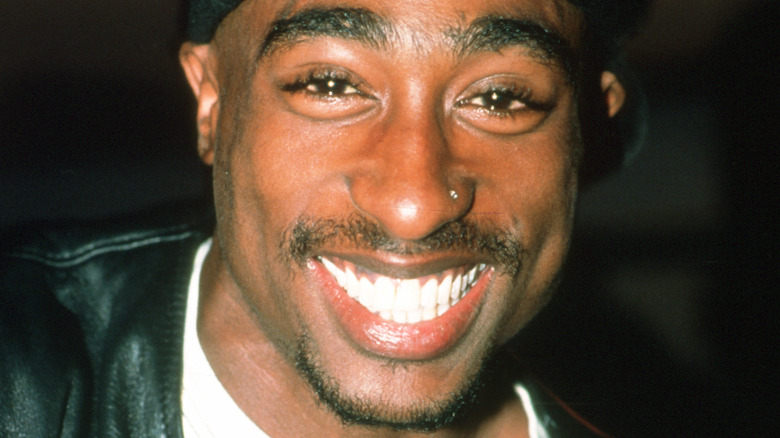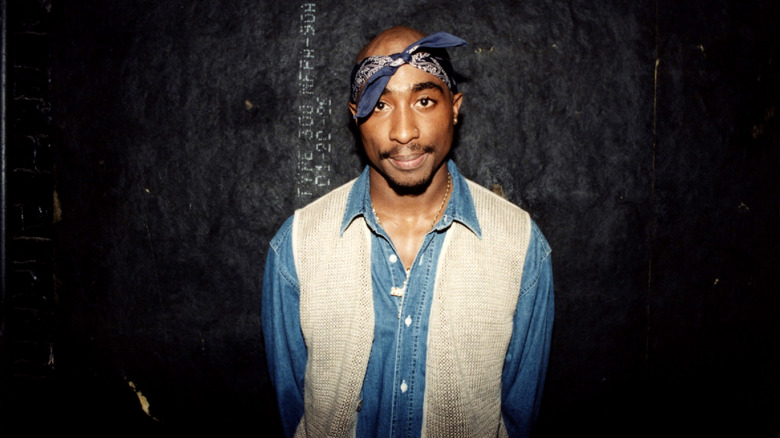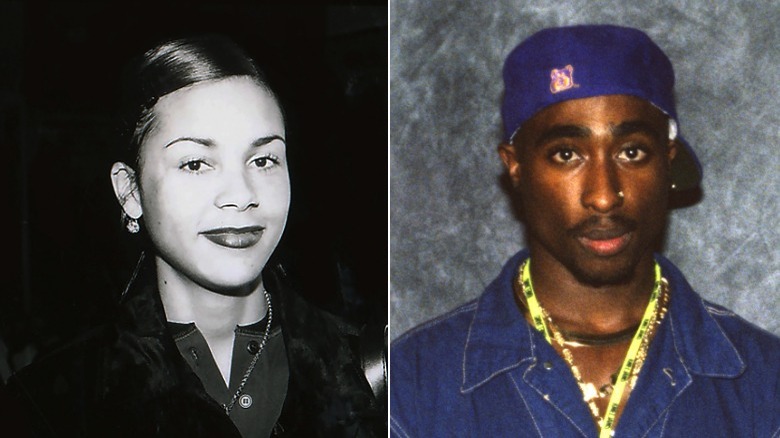How Tupac Shakur Nearly Saved His Own Life
Tupac Shakur's mother had herself envisioned a future for her son that knew no geographical borders. Before he turned 1, Afeni Shakur legally changed her son's name from Lesane Parish Crooks to Tupac Amaru in honor of the last Inca ruler, according to historian Chuck Walker. In doing so, she hoped he would grow up influenced by other cultures. "I wanted him to have the name of revolutionary, indigenous people in the world. I wanted him to know he was part of a world culture and not just from a neighborhood," Afeni said, per Walker. Tupac was only 25 when he was shot dead in 1996, but his fame and legacy have exploded worldwide since then. Billboard argued in 2015 that Tupac is "perhaps the most influential rapper ever globally."
Tupac's impact is undeniable, but he also led a troubled life that led to controversy and brushes with the law. Given the context,Tupac's unsolved murder has proved fertile soil for countless theories, some plausible, many conspiratorial. Interest in his death intensified when Tupac's musical rival Christopher Wallace, or Notorious B.I.G., was also killed in a drive-by shooting just six months later.
Fans aren't the only ones fixated on Tupac's death. The rapper himself spent a lot of time worrying about his safety, especially since the failed attempt on his life that had taken place in 1994, two years before his death, per Biography. Because he was careful, Tupac almost prevented his own murder.
Tupac Shakur almost wore a bulletproof vest that night
After Tupac Shakur was shot and wounded during a robbery in Manhattan, the rapper developed the habit of putting on a bulletproof vest in situations he judged dangerous, the South Florida Sun-Sentinel reported in 1996. Tupac also hired a bodyguard and made sure he sat facing the door anywhere he went, according to the 2010 biography "Tupac Shakur: The Life and Times of an American Icon." In a 1995 interview with the Los Angeles Times, he described his mindset after the shooting: "It's been stress and drama for a long time now." But on September 7, 1996, Tupac opted to leave his bulletproof vest at home back in California. Had he had a destination other than Las Vegas, he would have worn it, according to Vanity Fair.
Before his trip to Nevada to see the fight between Mike Tyson and Bruce Seldon at the MGM Grand, his fiancée Kidada Jones, daughter of iconic producer Quincy Jones, packed his belongings for him. "What do you want me to pack?" Kidada asked, per the magazine. Tupac seemed indifferent, so Kidada reached for his bulletproof vest. "No. It'll be too hot," he told her. In a chapter of "The Autobiography of Quincy Jones," Kidada retold feeling uneasy that night. "I knew he should have never gone to Vegas that night. I had a horrible feeling about it. I've gone over it in my mind a million times. It wasn't supposed to happen," she wrote.
Tupac Shakur and Kidada Jones wanted to start a family
When Tupac Shakur was shot dead, he and his fiancé Kidada Jones had been living together for four months, according to "The Autobiography of Quincy Jones." At that time, they had begun to seriously talk babies. Every time Kidada brought up the issue in the past, Tupac would say he refused to bring a child into "such a corrupt world," per Vanity Fair. But things had changed. The article detailed that Tupac had recently found a place in Beverly Hills and promised Kidada they would move in when they returned from Las Vegas. After settling in, they would start trying for a baby.
Tupac and Kidada had met the previous year, in 1995, at a club, she wrote. The meeting took place after Tupac gave an interview in which he criticized Quincy for marrying a white woman, actor Peggy Lipton. "...[H]e said, 'I want to apologize to you. I didn't mean that about your dad or you. I didn't see you as real human beings. Now that I see you...'" she detailed. She knew he was "all game," but Kidada was charmed nonetheless.
After Tupac and Kidada had been dating for some time, Quincy approached them unexpectedly for a heart-to-heart with the rapper. Though the musician he previously disliked Tupac, he learned to accept him after that day. "[H]e understood and respected Tupac, and he wasn't angry at Tupac at all," she wrote.



